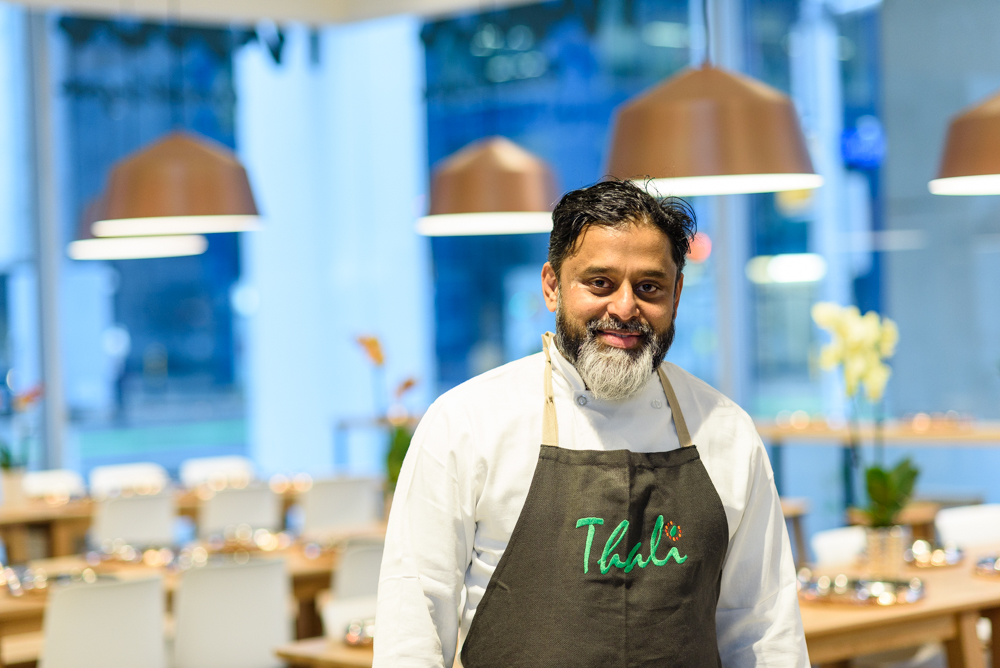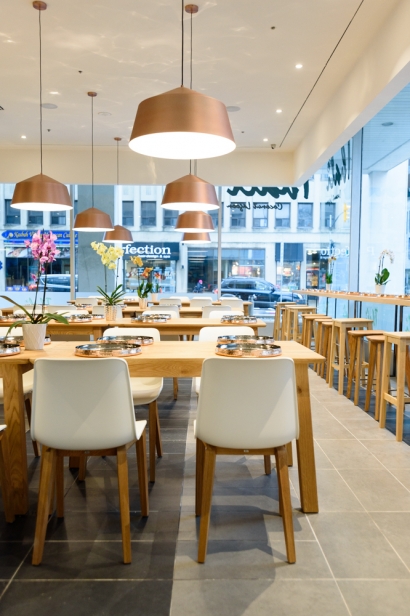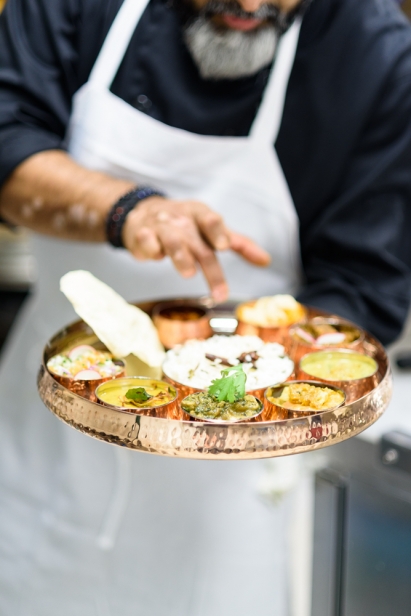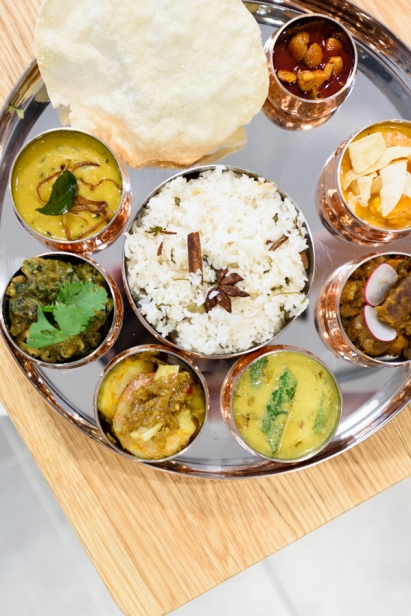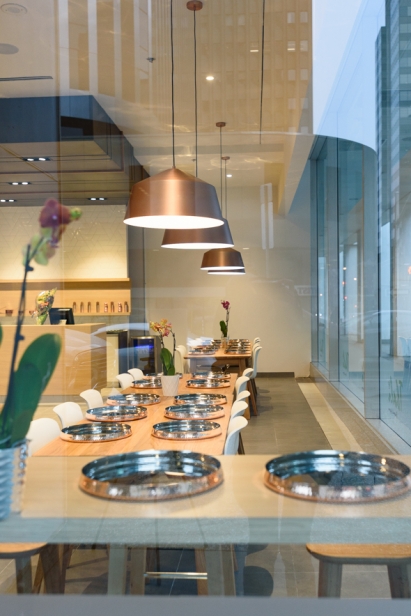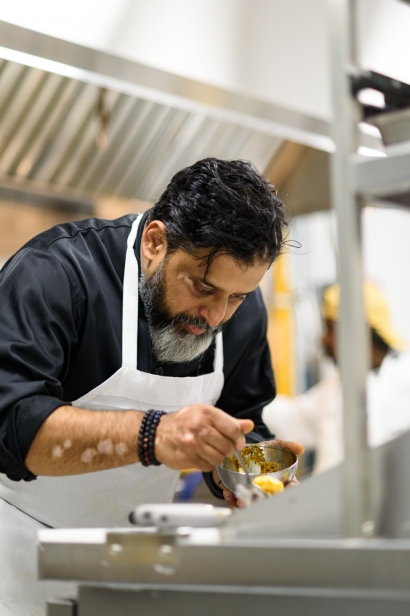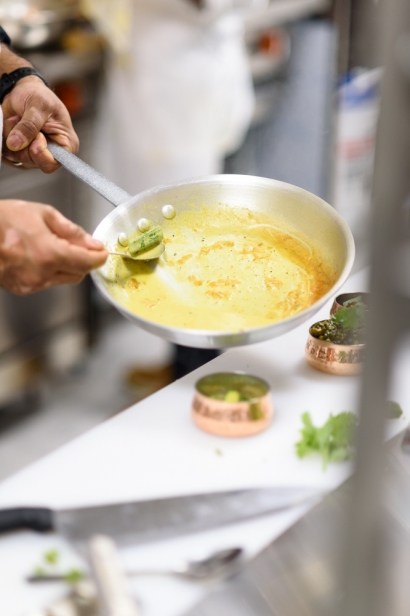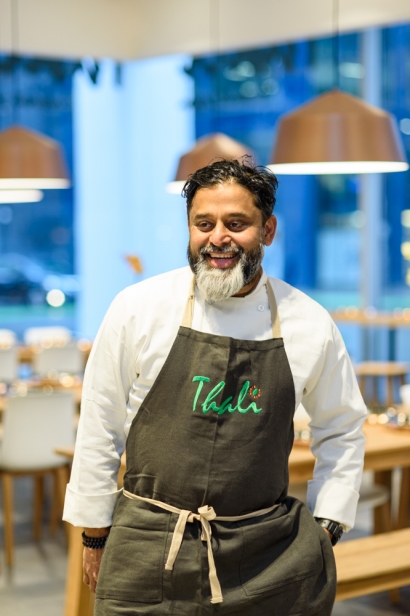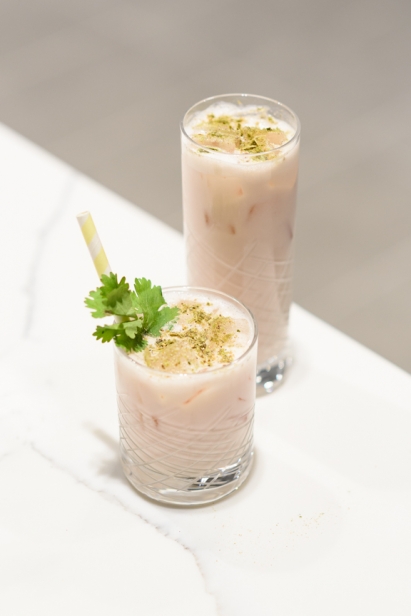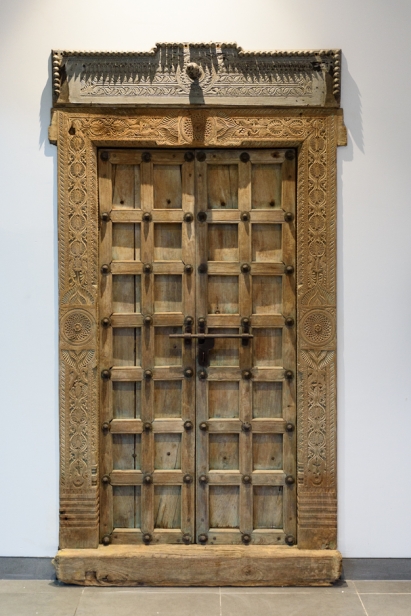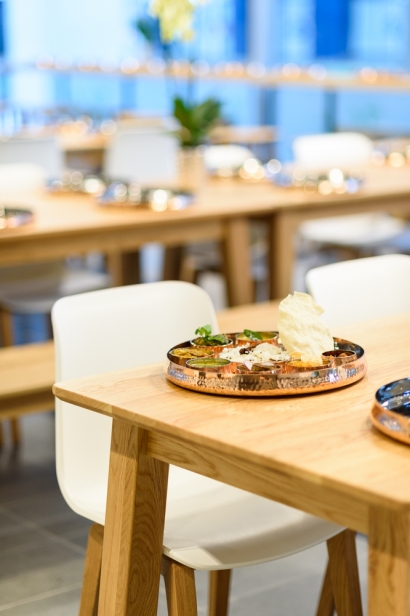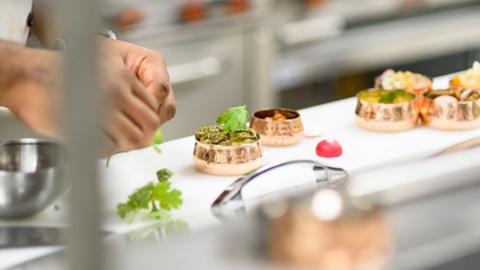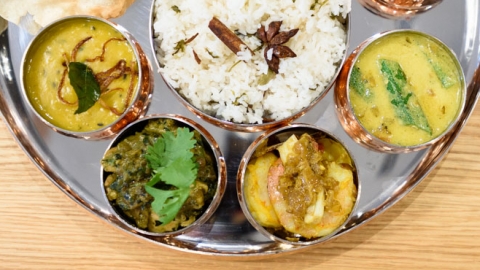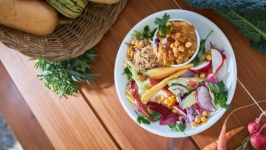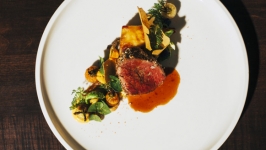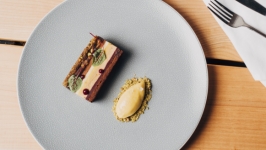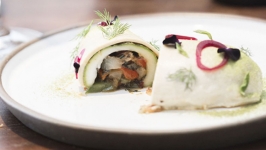Like Coming Home
For a person who grew up in India, thali “feels like coming home.” That’s how chef Joe Thottungal describes the traditional Indian dish. He says it’s comfort food, something that immediately takes him back to his childhood in Kerala, a state on the southwest coast of India. And he should know: He’s just opened a restaurant devoted to thalis.
“A thali is a complete meal,” the chef says. “It can be vegetarian, but it can also have meat. It’s basically a four-course meal served on one platter. You have protein, carbs, vegetables.”
He compares thali to mac ’n’ cheese for Westerners and, in a way, it’s how Indian families eat most evenings — lots of spice, lots of flavour, plenty of variety and don’t forget the chutney. But they don’t necessarily use the shiny copper serving platters that Thottungal’s restaurant does. That platter, with its several compartmentalized bowls, is what makes a thali a thali.
The new restaurant is — wait for it — called Thali. Perched on the northwest corner of O’Connor and Laurier streets in downtown Ottawa, it is open for lunch and dinner with no break in between. It serves thalis to the downtown lunch crowd before converting to a more intimate setting for dinner.
Lunch is a one-platter deal, while dinner will offer about the same amount of food, but in courses, with à-la-minute service to keep things fresh and warm. One course might be, for example, a little scallop served with a nice chutney. It would be served on its own on the thali platter. Then you might have soup and poppadum, followed by a couple of small curries and then a dessert. At lunch, the small bowls come at the same time and are full of different curries, chutneys, a soup and a dessert.
A colourful sample plate he served up before the restaurant was official open featured rice, set on a banana leaf in the middle of the platter. Around the edges, small metal bowls brimmed with coconut-cranberry chutney; pineapple and yogurt raita; a cabbage and spinach dish, an okra mapas coconut-milk curry; paneer and mango in a spicy chili and tamarind sauce; spiced eggplant; a tomato-based soup; and a mushroom and peas dish. Thali serves a daily bread with the plate as well. It might bechapatis one day and parotha the next and poori on yet another day.
“Thali is typical all over India,” he says. “If you research thali, you’ll find people saying it’s an inexpensive dish. It’s maybe 100 rupees, [$1.85]. Westerners think it’s a good deal, but in India, it's just the way we eat. We want sweet, sour, tangy, and spicy.
“Everything changes every day,” Thottungal says. “This gives the kitchen creativity. The main goal was to offer different food from the Coconut Lagoon.”
It started with south Indian
Coconut Lagoon is Thottungal’s first restaurant, which he opened 15 years ago on St. Laurent Boulevard. It quickly distinguished itself as one of the city’s best destinations for south Indian food in spite of its location on a busy suburban street. The new restaurant has the same quality food, but different dishes and a much more urban setting. It will also occasionally offer cooking classes, he says.
Thottungal is a fixture in Ottawa’s dining scene; the awards on the walls of his restaurants speak to his success. There’s one from a savoury chocolate contest in Toronto in 2001, in which he made a quail stuffed with chocolate mousse and won third price. The winner was celebrity chef Ned Bell and MasterChef ’s Claudio Aprile took second place. He also won a bronze at Ottawa’s Gold Metal Plates in 2015 and then he won gold in Ottawa in 2016. In 2017, he won silver at Gold Metal Plates’ national competition in Kelowna.
In spite of the awards and honours, he’s a humble man. Talking about his culinary philosophy, he says, “It is very simple: I just cook. I cook what I would like to eat. I want nice flavour, good seasoning. It’s the basics — true cooking.”
Another key feature of his food is that he’s always mindful of the audience. “I wouldn’t do a very exotic steak dish for an Indian who doesn’t have the palate for that,” he says. “It has to do with my experience, training and education. I learn what people like. I don’t want to just do curry and rice for a big competition. I will work with [the diners’] expectations. If you ask me to, for a dollar or two, fill up someone’s stomach, I will also do that — with passion.”
The passion is there for sure, but he emphasizes his work ethic and his desire to play around with ingredients and flavours.
“I’m still learning,” he says. “I’m like a student every day.”
To help in his learning, he regularly brings in different chefs to do stints in his kitchen. Last spring, for example, he invited Peter Joseph of London’s Michelin-star-rated Tamarind Mayfair.
“The reason I bring them is not to make money, it’s to learn,” he says. “For me to leave is impossible because I own the restaurant, but I can bring someone here and spend time with them in the kitchen.”
He’s done the same thing with former Dragon’s Den star and celebrity chef Vikram Vij of Vancouver’s celebrated Vij’s and also Milton Rebello of Regina’s Skye Bistro & Café. It takes some prodding, but he eventually admits that it’s possible they learn from him, too.
Early culinary influences
Asked about culinary mentors, he doesn’t hesitate before mentioning his mom, who happens to be visiting from India, partly because she wanted to be here for the opening of Thali. To this day, he still asks her to make coconut curries.
“My mother has good taste buds, and she has the magic touch — everything she makes is good,” he says.
His father, who spends his mornings and lunchtimes visiting at Coconut Lagoon when they visit Canada, never sets foot in the kitchen. “He wouldn’t know how to turn on the stove,” Thottungal says with a laugh. But the chef did have an unlikely male mentor in his grandfather.
“He had a long retirement and I think he got bored,” Thottungal says. “He learned how to make himself snacks mostly — for his afternoon coffee.”
Thottungal himself started cooking when he was about 12, after school. He has four brothers, one older and two younger, and he would cook snacks for them after school, before their mother returned from work.
In 1991, after he graduated from high school, he enrolled in a three-year program at the Asan Memorial Institute of Hotel Management in Chennai, on the Bay of Bengal. He had to study the whole business — front of house, kitchen, housekeeping, service, menu engineering and accounting — but he concentrated on cooking.
“I learned all cuisines,” he says. “We made consommés, all the classic soups and sauces. Cooking has no boundaries. Once you have the basic skills — searing and roasting, for example — you can adapt a recipe. Our textbook was the Larousse Gastronomique.
After he graduated in 1994, he took a job in Mumbai and the following year, he moved to Saudi Arabia to work at the Oasis Resort in Al Khobar, a seaside city on the Persian Gulf, where he cooked mainly Western food for British tourists.
“We had fresh asparagus coming in from Holland, the cheese was from France,” he says. “We cooked dover sole and prime rib on Sunday. We had an Italian chef, a French chef and a British chef. This helped me broaden my learning.”
A 12-day courtship
He emigrated to Toronto in 1998 and worked at hotels there, too, including the Park Hyatt and the celebrated Royal York. Three years later, he went back to India to get married. He met his prospective wife — it was a marriage arranged by their parents — at the beginning of his three-week vacation. Five days later, there was an engagement party and a week after that, the wedding took place. After a short honeymoon, he returned to Toronto. His wife, Suma, got her papers in order and emigrated to Canada about six months later.
The two didn’t want to raise their family in Toronto, so he sought work elsewhere. He first worked at the casino in Windsor before deciding to move to Ottawa. He worked at the Crown Plaza for a year before cobbling together the resources to open Coconut Lagoon.
Has the arranged marriage worked out? Eighteen years and three children later — a 15-year-old daughter, a 12-year-old son and another son who’s three — he says he and his wife are still happy.
It might sound mysterious to Westerners, but he says the families do a good job of vetting their prospects. His parents and aunts had met his bride a month before the wedding.
“It was exciting,” he says of the trip in which he left a single man and returned a married one.
His children, who were all born here, are very much Western and mystified by it. “My 15-year-old asks me how we could do that,” he says. “We always tell her it wasn’t just finding someone in the market and marrying them. There’s a lot of work going on in the background.”
His three brothers also had arranged marriages and while he doesn’t expect his children will, the family maintains their heritage. They return to India every two years andspeak their native Malayalam. They also watch Indian movies and, needless to say, eat the cuisine.
Food without limits
Kerala is one of the hubs of Christianity in India and the Thottungal family is Catholic, so all meats were open to him (Hindus don’t eat beef and Muslims don’t eat pork). His family ate beef at least once a week and lamb and pork made frequent appearances, too. Lobster, kingfish, shrimp and sardines were also common as Kerala is a coastal state.
And today, the family remains close though his parents and one younger brother, a banker, live in India. His two other brothers live in Ottawa and work at Coconut Lagoon. One runs the front of house and the other cooks. His parents visit Ottawa about once every four years and stay for three months at a time.
The two brothers will keep things humming at Coconut Lagoon while their chef brother takes top spot downtown as the new location becomes established. If Thottungal was successful in making a small place on St. Laurent Boulevard into the institution it now is, there’s little doubt Thali will win the hearts of downtown desk warriors.
Thali
136 O'Connor St., Ottawa, Ont.
thaliottawa.ca | 613.594.4545 | @thaliottawa


